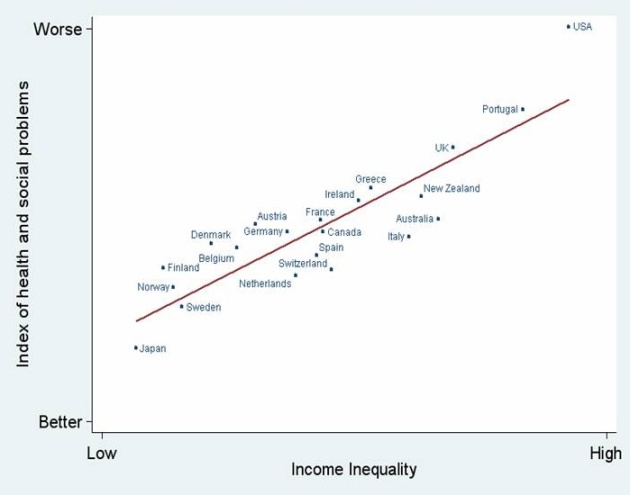By Warwick Smith
A search of the government’s recently released Intergenerational Report for the word “inequality” yields zero results. The same is true for “income distribution” and “wealth distribution”. This is not surprising because conservatives are basically forced by their other beliefs to play down the importance of inequality.
As many others have pointed out, the Intergenerational Report is an inherently political document and is much more informative about the current government than it is about the actual future of the country. The very short treatment of climate change in the report is a case in point. Another important element that was present in the 2010 report that is entirely absent from the 2015 version is any mention of wealth and income distribution. Instead, the 2015 report relies entirely on averages for reporting income and wealth.
Using the average (or mean) value for income and wealth can conceal very important information. Distributions can be measured and modelled just as averages can be measured and modelled. Not reporting on or modelling distributions is therefore a deliberate choice.
If you have 100 people in your economy and 99 are in abject poverty while one is a millionaire, average wealth is about $10,000. If that millionaire doubles their wealthy to $2 million the average wealth also doubles to $20,000. Based purely on averages it looks like things are going really well despite 99 percent of the population living in poverty and nothing improving for them. This is not an entirely unrealistic scenario. In the United States, since the 2008 financial crisis, a staggering 93% of income growth has gone to the top 1% of income earners. The average income has grown but the bottom 99% of income earners have mostly seen wages stagnate or fall. If we only heard about average incomes during that period we could be fooled into thinking US incomes are recovering from the financial crisis.
Equality of outcome is required for equality of opportunity
The negative consequences of extreme inequality have been very well documented by numerous studies in a variety of fields. Nations with high levels of inequality have poorer outcomes across a huge range of health and wellbeing measures, from teenage pregnancies to drug and alcohol problems.

Income inequality has a huge impact on health and wellbeing even among wealthy western nations. Graph from ‘The Spirit Level’.
Conservatives, by definition, tend to defend the status quo with respect to institutional structures. This means that if current structures are resulting in increased inequality then they are driven to dismiss or play down the importance of inequality. In fact, many conservatives consider inequality to be essential in order to provide incentives for hard work. However, there is only value in an incentive to climb the ladder if climbing the ladder is possible.
The reality is that the more unequal a country is, the lower equality of opportunity they tend to have. Equality of opportunity relies, to some extent, on a degree of equality of outcome. Parents in poverty cannot provide their children with the same opportunities that wealthy parents can no matter how intelligent, well intentioned or well informed they are. Similarly, children in poor communities will likely attend schools with poorer student outcomes and lower teaching standards than those in wealthy neighbourhoods.
When it comes to inequality, conservatives are trapped between conflicting articles of faith; small government and meritocracy. The data imply you cannot have both. Meritocracy requires considerable government intervention, particularly in education, health and welfare.
The policy leaders in this area are the Nordic nations of northern Europe and we would do well to pay more attention to their successes. Not only do these nations have relatively low levels of inequality, they have high income mobility and score very well on measures of life satisfaction and wellbeing. They achieve this through a complex web of legislation but it is underpinned by well-funded universal healthcare, education and welfare systems. The effect of these is to provide more than just a safety net but rather a baseline standard of living such that everyone can live a dignified life. This seems to me the very essence of a civilised society and is certainly within reach of all wealthy western nations.
We can see why Hockey and Abbott chose to remove references to inequality from their Intergenerational Report. Honest discussion of inequality reveals the incoherence of their broader social vision. When reduced to outcomes, the conservative political agenda of defending current structures and institutions manifests as simply protecting the interests of wealth and power at the expense of the rest. That’s all it ever has been – the rest is smoke and mirrors.
